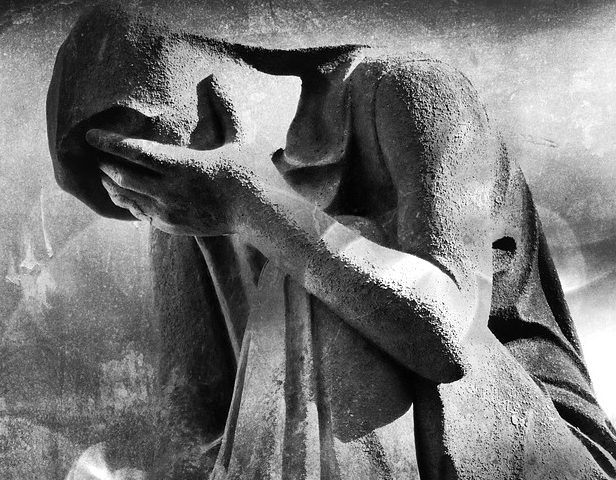One of the most difficult questions facing any religious person is: how can an all-knowing, loving God allow tragedies in our lives? If the great thinkers and theologians of the world have not fully answered this question yet, I won’t be able to do it today, but I would like to focus on how this theme relates to Jesus’ own life and ministry and to those closest to Him.
Over and over again, a difficult truth is revealed in the Bible. While the Bible makes repeated claims that God knows and loves us each individually, it is rare that He spares individuals suffering. Even Jesus did not heal everyone, or even close to everyone He came across. While He did seem to heal out of compassion or because of an individual’s faith, there is a greater common theme involved: He usually healed people with the larger purpose of confirming His divinity. Miracles are actually quite rare in human history, and primarily recorded during times of special revelation (i.e. Noah, Moses, Elijah/Elisha, Jesus). Based on Biblical text, it seems likely that Jesus waited to reveal Himself and heal anyone until He was about thirty years old. A reasonable assumption is that these miracles were not done merely to relieve individual suffering- in which case He would have been performing them all day every day- but to bring about His plan and reveal His message.
A perfect example of this concept is seen in the story of Lazarus- one of the greatest miracles recorded during Jesus’ time on earth. Jesus was particularly close to siblings Lazarus, Mary, and Martha. However, when Jesus received word that Lazarus was ill, he waited two days to go to the family. In fact, before even arriving or being told that Lazarus had died, He said to His disciples:
“Lazarus is dead, and I am glad for your sakes that I was not there, so that you may believe. But let us go to him.” (John 11:14-15)
Jesus loved this family, and when Mary ran to him upon his arrival, weeping and telling Him that her brother had died, the text tells us that He also wept. This is incredibly powerful. Jesus loved Lazarus and his siblings, and He even wept at the news, but He did not prevent the death or suffering. The reason soon becomes apparent in verse 36:
“So the Jews were saying, ‘See how He loved him!’ But some of them said, ‘Could not this man, who opened the eyes of the blind man have kept this man also from dying?’”
Jesus knew that the greatest testament to His ministry and His power was through Lazarus’ resurrection, not through his healing. In John 11:42, before performing the miracle, Jesus thanks the Father that those around Him may see and believe. Although he loved Lazarus, although he wept, although he was touched and influenced by Mary’s faith, His ultimate purpose was not to spare this family suffering, but to prove His divinity. That is a powerful realization.
When grappling with this question of the meaning of suffering and why God allows it, I often return back to a thought that is simultaneously both comforting and disturbing. Jesus Himself was not spared unspeakable suffering. When contemplating suffering, sometimes we are able to brush off the sufferings of Jesus, saying to ourselves, “Well, He was God. He had a greater capacity to endure than the rest of us and a greater understanding of His ultimate purpose.” This is true, although He was also man, and had to endure the same temptations and fears as the rest of us. Even so, it is useful to look at the cases of those close to Him for more relatable examples of those who were not spared suffering. One of the most powerful examples of this concept can be seen in the life of Mary. Just recently, I was struck once again when I read the verse:
“And Simeon blessed them and said to Mary His mother, “Behold, this child is appointed for the fall and rise of many in Israel, and for a sign to be opposed- and a sword will pierce even your own soul- to the end that thoughts from many hearts may be revealed.” – Luke 2:35
The context behind this verse is that Mary, who was specifically chosen by God and called blessed among women (Luke 1:42) and told that she had found favor with Him (Luke 1:30), had only been a mother for 8 days. She was taking her son to be circumcised, following the laws of the Jewish people. Fresh out of delivering her child, she was already being given a prophecy about her future suffering. The pronouncement, “And a sword will pierce even your own soul,” is referring to the great suffering she would endure, witnessing her son’s rejection by the people and eventual torturous death. She was at the foot of the cross as He died a horrendous death. Imagine what a mother would endure in such a scenario! Even a woman who found such favor in God’s eyes was not permitted to escape incredible emotional pain. In fact, it was BECAUSE she was chosen to bear the Savior that her pain was brought upon her. Had she lived a less godly life, she would most likely have also lived an easier life.
As Mary was not spared pain, neither were the other people closest to Jesus, His disciples. These men, who followed Him so closely for His three years of earthly ministry, were presumably very special to Him. Nevertheless, they also experienced torture, hardship, and death for the sake of their cause. Again, it was actually BECAUSE they were chosen that they suffered so intensely. Jesus Himself warned:
“Then you will be handed over to be persecuted and put to death, and you will be hated by all nations because of me.” (Matthew 24:9)
In addition, the apostle Paul, perhaps the greatest evangelist, was beaten, shipwrecked, imprisoned multiple times, and ultimately beheaded. He wrote:
“We sent Timothy, who is our brother and co-worker in God’s service in spreading the gospel of Christ, to strengthen and encourage you in your faith, so that no one would be unsettled by these trials. For you know quite well that we are destined for them. In fact, when we were with you, we kept telling you that we would be persecuted.” (1 Thes 3:2-4)
What can we make of this, and how does it relate to our own sufferings? It is clear that God does not promise us lives free of suffering here on earth. The temporal is the least important of His concerns, as evidenced by verses such as Matthew 10:28:
“Do not be afraid of those who kill the body but cannot kill the soul. Rather, be afraid of the One who can destroy both soul and body in hell.”
We are obsessed with the temporal, since that is our primary reality, but anyone who looks deep within their hearts will also feel the longing for the spiritual and realize that there are realities outside of what we can see and measure. The only promises God makes to us are the eternal, compared to which this life is just a dream. While God does not delight in or enjoy our sufferings, He seems to have a different attitude toward them than we do. He does not see suffering or even death as the ultimate thing to fear or avoid. The thing we are over and over again reminded to fear is the corruption of our souls, not our bodies.
The entire biblical record is a history not of individuals, but of how those individuals fit into a grand plan. The plan began when God created man with the free will to choose or not choose to be in communion with Him. After the inevitable consequence of not having created loving and perfectly behaved robots, sin entered the world, as He knew it would from the beginning. At this point, the story becomes a long history of how God sets apart a people, Israel, who would lay the foundation for the arrival of the Messiah to bring us back into communion with Him. This was certainly the harder way to go, rather than creating perfect beings whose love was compelled, and it does mean that not all beings will make that choice, but the ones who make it will not be coerced into doing so. When looking at the record, every act of God was with this purpose, because of His desire to commune with us through our own choice and His love for us. This, however, is both an individual and a communal love. The individual is not greater than the whole purpose. My suffering is not greater than the saga of free will, natural death, and ultimate regeneration through Christ’s sacrifice.
If the world was structured differently, our relationship with suffering would also be different. Without free will, much suffering certainly could be avoided. Free will allows us to hurt others and them to hurt us. Even so, most people would rather have the choice to act rightly or wrongly, even if others’ choices often cause us pain. Without physical death, resulting from free will, much suffering could also be prevented. The physical world and our corruptible bodies allow disease, mutations, and difficult deaths. This is a hard truth, but for a Christian, the physical death is not the greatest truth or the greatest fear. To a non-believer, this is an odd point of view, which Paul acknowledged:
“For the message of the cross is foolishness to those who are perishing, but to us who are being saved it is the power of God.” (1 Cor 1:18).
Without Jesus’ life and sacrificial death, Mary’s suffering could even have been avoided, but even His own mother was not a bigger concern to Him than His plan to save humanity. We are individually loved, but we are small parts of a greater plan. There is hope, however, because this greater plan is for each one of us, and we may share in the reward.
It is a comforting final thought that although Jesus did not spare even His own mother, some of His last earthly thoughts were for her suffering. While dying, He looked down to the base of the cross and commanded John to care for her:
“When Jesus saw his mother there, and the disciple whom he loved standing nearby, he said to her, ‘Woman, here is your son,’ and to the disciple, ‘Here is your mother.’ From that time on, this disciple took her into his home.” (John 19:26-27)
This is a great testament to the fact that God is not blind to our pain and our sorrow, though He will not always prevent it. In his last address to his mother, he referred to her as “woman,” indicating that his earthly relationship with her was ending. She was the earthly vessel chosen for perhaps the greatest cause, but individually, she was not more important than His purpose. It could never be denied, however, that He saw her and He loved her. The purpose for which she suffered was meant for her ultimate joy and restoration.
Thanks for reading, and don't forget to Click here to Subscribe!About the Author

|
Jackie Chea is a blogger from San Antonio, Texas who holds a B.A. in Psychology and an M.A. in Community Counseling from the University of Texas at San Antonio. She writes on political and cultural issues from a conservative, religious standpoint. She lives in the Lone Star State with her husband, Nick, and their 7-year-old son, Lincoln. |


Very well written. A good reminder that all this is temporary and just a spec of a larger plan, but this is so hard to remember and understand while in a deeply painful experience. There is however comfort knowing that God didn’t promise an easy path voided of pain, he did however promised to be with us every step of the way and ironically it has been during my most difficult times when I felt this truth closer. Even in my despair and anger God was there… fulfilling his promise. Keep up the great posts!
As usual, your lucid writing penetrates to our very soul, where our conflicted desires for everything to be OK are met with the physical realties of daily life, where we experience (sometimes intense) pain and suffering. Your penetrating insight and wisdom defies your still youthful perspective. Way to go, Jackie!